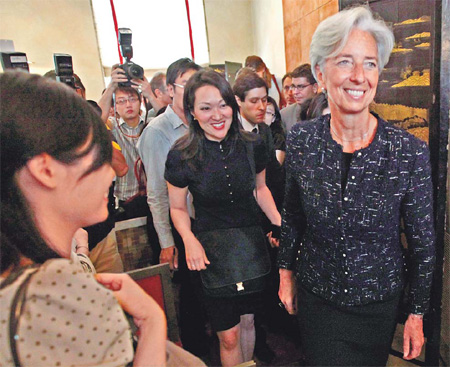Lagarde seeks China's support for top IMF job
France's Finance Minister Christine Lagarde, a leading candidate for the top job at the International Monetary Fund (IMF), said she was "very satisfied" after meeting senior Chinese officials, even though China has not publicly declared who it will back to head the IMF.
She told a news conference in Beijing on Thursday that if her candidacy is successful, her immediate priority will be the euro debt crisis.
Lagarde said she supported the decision to increase China's voting rights at the IMF from about 4 percent to nearly 6.4 percent.
She made the remarks after meeting Vice-Premier Wang Qishan, central bank governor Zhou Xiaochuan, Minister of Finance Xie Xuren, and Foreign Minister Yang Jiechi.
The nomination process for candidates seeking to head the IMF closes on Friday. The position became vacant following the resignation of Dominique Strauss-Kahn after he was arrested on sexual assault charges in New York, charges that he denied.
The leadership campaign has sparked disputes between European countries and emerging economies over the traditional European stranglehold on the position of IMF managing director.
Another candidate, Agustin Carstens, Mexican central bank governor, is visiting Asia to drum up support.
He will meet officials in Beijing next week.
Lagarde said that she agreed with Chinese officials in two core areas - the selection process and reform of the IMF.
"(We agreed that) the selection process for the managing director of the IMF should be open, transparent, and merit-based, irrespective of his or her nationality."
Lagarde also stressed the importance of reform and that it must "be continued and developed, both in relation to the governance of the fund, and to the appropriate representation of its members".
China was one of the countries underrepresented, she suggested.
John Lipsky, acting managing director of the IMF, was also in Beijing and said at a news conference on Thursday that the organization is confident that its members will choose a leader who is "effective, energetic and experienced".
With the nomination process closing, another process will shortlist three candidates, he said.
The candidates will be interviewed by the executive board, representing IMF members. A final decision will be made on or before June 30.
Chinese analysts are divided on which candidate Beijing should support.
"Getting support from China will not change the result, although it is very important for Lagarde," Dong Yuping, economist with the Institute of Finance and Banking at the Chinese Academy of Social Sciences, said.
Support of the emerging economies is important for any candidate, Dong Xiaojun, a professor at the Chinese Academy of Governance, said.
"The votes of the BRICS (Brazil, Russia, India, China and South Africa) countries account for 11 percent, a big portion that cannot be ignored."
A winning candidate needs 85 percent of the votes to get elected.
Under the voting system used by the IMF, the US and Europe have been able to ensure that a European candidate runs the IMF while a US citizen takes charge at the World Bank.
The IMF executive directors for the BRICS countries said that the tradition whereby a European always heads the IMF undermines the legitimacy of the institution and should be ended.
But this will be very difficult, Dong Yuping said.
"The joint votes of the European countries and the US determine who will be managing director. Besides, developing countries are not very united on the issue."
He said China should endorse Lagarde and seize the chance to recommend a Chinese deputy managing director.
Lagarde was asked if Zhu Min, a special adviser to the IMF's managing director, would become deputy managing director if she got China's support. Lagarde praised Zhu as "fully appropriate" for playing a bigger role in the fund.
Some analysts predict that Carstens could win.
"Compared with Largarde, Carstens stands a better chance because Mexico is an emerging economy and the US is likely to support him due to the close ties between the two countries. What's more, he has experience of dealing with sovereign debt problems," said Lu Zhengwei, chief economist at the Industrial Bank.
China is the third leg of Lagarde's global tour after Brazil and India. She will also meet African representatives in Lisbon and visit Saudi Arabia on Saturday and Egypt on Sunday.
 0
0 







